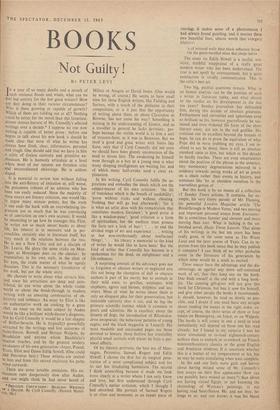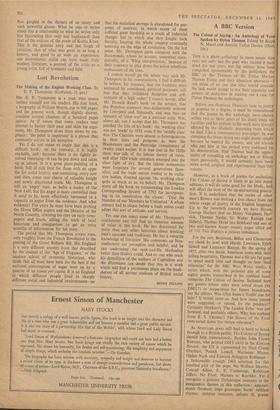BOOKS
Not Guilty!
B Y PETER LEVI IN a year of so many deaths and a month of such ominous floods and winds, what can we feel but anxiety for the few ,good writers? How are they doing in their various circumstances? Who is there growing or capable of growth? Which of them are holding out at all? Nothing could be better for the mood than this luxuriant, almost riotous harvest of Mr. Connolly's selected writings over a decade.* I suppose no one now writing is capable of better prose: before one begins to talk about his new book it should be niade clear that most of what he writes has always been fresh, clear, informative, personal and tough. One should add that we have in him a critic of tireless curiosity and primitive en- thusiasm. He is humanly articulate at a level where most of our natures are formless cries and uncoordinated shiverings. He is seldom duped.
It is essential to review him without falling into the anti-flattery of imitation or, still worse, the poisonous tributes of an admirer who has been too easily seduced. Since the majority of these essays are literary criticism, one would like to argue many minute points; but the truth is one ends the book with an overwhelming im- pression not so much that he was convincing as of conviction on one's own account. It would be interesting to see how he manages this. First, he writes not so much about' books as about life, his interest is in memoirs and in per- sonalities, certainly also in literature itself, but very much in the relations between the two. He is not a New Critic and not a disciple of Dr. Leavis. He plays the same tricks on Mon- taigne as Montaigne does on the classics: he essentialises in his own style, in the slant of his eyes, the crude matter of what he openly discusses. This is the necessary foundation of his work, but not the whole story.
He chooses to write about what attracts him, and since his attractions are deep and unin- hibited, he can write about the whole visible world or about the break-through in modern writing with an amazing combination of ob- jectivity and intimacy. An essay by Eliot is like an authoritative work on cooking by a great chef, an essay on the same subject by Auden would be like a brilliant witch-doctor's diagnosis, but by Cyril Connolly it would be a lost chapter of Brillat-Savarin. He is (typically) powerfully attracted by the writings and lost universes of Saint-Simon, Boswell and Horace Walpole, by Baudelaire and anyone whom Baudelaire's shadow touches, and by the greatest modern awakeners of his own generation—Joyce, Pound, Yeats, Eliot and Dame Edith Sitwell. (One could add Petronius here.) These writers. are central to him and from this sacred enclosure his paths wind outwards.
There are some notable omissions. His en-• thusiasm runs dangerously slow after Auden, and one might think he had never heard of
* PREVIOUS CONVICTIONS: SELECTED WRITINGS OF A DECADE. By Cyril Connolly. (Hamish Hamil- ton, 30s.) Milosz or Aragon or David Jones. (One would be wrong, of course.) He seems to have small time for those English writers, like Fielding and Surtees, with a touch of the philistine in their composition, or is it just that the opportunity of writing about them, or about Clarendon or Browne, has not come his way? Something is missing in his understanding of Greece, and as a traveller in general he lacks devotion: per- haps because the visible world is to him a sort of treasure-hunt, as it was to Berenson. But we need a good and great writer with limits like these, only that if Cyril Connolly did not exist we should have been glumly unconscious of the need to invent him. The awakening he himself went through as a boy or a young man is what many sleeping intelligences are waiting for, and of which many half-awake need a clear ex- planation.
In his writing, Cyril Connolly fulfils the as- pirations and embodies the ideals which are the subject-matter of his own criticism: 'the lilt of transience which is the breath of readability'; 'prose without tricks and without cheating. Nothing that will go bad afterwards'; 'for it is what an artist does with his romanticism that constitutes modern literature'; 'a good prose is like a window-pane'; 'good criticism is a form of spiritualism, but the medium must possess the facts not a lock of hair'; . . to end the divided reign of art and experience . . . writing at last non-intellectually about intellectual things'; . . his library a memorial to the kind of writer he would like to have been.' But the kind of writer that Connolly has become is a spokesman for the dead, an enlightener and a life-enhancer.
A surprising amount of his advocacy goes not to forgotten or obscure writers or neglected arts (his not being the champion of dull or obscure authors is part of his merit), but to animals in their wild state, to gorillas, antelopes, wild elephants, egrets and herons, dolphins and sea- otters. Most of what he writes about them is only an eloquent plea for their preservation, but insatiable curiosity ekes it out, and he hv the primary scientific instinct which is common to poets and scientists. He is excellent about the dreams of dogs, the introduction of Rhododen- dron sinogrande, the behaviour patterns of young eagles, and the black magnolia at Lanarth. His most readable and unclouded pages are those devoted to lemurs, those forlorn but irresistibly playful small animals with whom he feels a per- sonal affinity.
Of his literary portraits, the best are of Mon- taigne, Petronius, Samuel Rogers and Edith Sitwell. I choose the first for its surgical pene- tration of a most complicated subject and for its tart but irradiating humanism. The second I think astonishing because it made mes look more clearly at a writer whom I not only know and love, but first understood through Cyril Connolly's earlier criticism, which I thought had absorbed. His portrait of Samuel Rogers is as close and economic as an expert piece of shaving; it makes sense of a phenomenon I had always found puzzling, and it rescues these two beautiful lines, almost worth that vinegary
rad terraced walls their black reflection throw On the green-mantled nioat that sleeps below.
The essay on Edith Sitwell is a tactful, sen- sitive, truthful reappraisal of a really great modern writer who has been undervalued. The case is not spoilt by overstatement, but a quiet satisfaction is vividly communicated. This is the critic's best art.
Two big, painful questions remain. What in an honest analysis can be the position of such a writer in literature today, and what should be the verdict on his development in the last ten years? Sunday journalism has defrauded him, during this decade of absolute greatness. Enthusiasms apd curiosities and aphorisms even so brilliant as his, however marvellously he sus- tained and even widened the form of the short literary essay, are not in the end godlike, His criticism can be excellent beyond the bounds of hope, he can do in prose the equivalent of what Pope did in verse (rubbing my eyes, I am in- clined to say he does), there is still an absolute standard open to him, but which in this decade he hardly reaches. There are even uncertainties about the position of the phrase in the sentence, tiny momentary degenerations mirrored in a tendency towards seeing works of art as jewels on a chain rather than events in history, and sentences like 'let us abandon ourselves to the marvellous genius of . .
But this book is by no means all a collection cf Sunday Times articles. It contains, for ex- ample, his very funny parody of Mr. Fleming, his powerful London Magazine article 'The Breakthrough in Modern Verse,' and two moving and important personal essays from Encounter. He is sometimes funnier and cleverer and more moving than ever. What is lacking is the un- finished novel, Shade Those Laurels. That alone of his writings in the last ten years has been really great, in the same sense as The Waste Land and the later poems of Yeats. Can its re- jection from this book mean that he may publish it complete? I can think of no other probable event in the literature of his generation by which mine would be a tenth so excited.
These essays have the advantage and the dis- advantage, as against any more self-contained work of art, that they keep one on the hook. One finds oneself at the end with a long book- list. The cunning gift-giver will not give this hook for Christmas, but buy it now for himself, and give other people the books it recommends. It should, however, be read as slowly as pos- sible, and I doubt if one need have any scruple about reading the essays in the right order, ex- cept, of course, the short series of three or four essays on Hemingway, on Joyce, or on Walpole.
The books it will create in one a need to read immediately will depend on those one has read
already; but I found to my surprise I was far
more stimulated to re-read eighteenth-century authors than to embark or re-embark on French
nineteenth-century classics or the great English
and American moderns. It is uncertain whether this is a matter of my temperament or his, but
he may be more stimulating when least complete.
In the end one feels more guilt and horror about having missed some of Mr. Connolly's best essays on their first appearance (how can one possibly have missed so many?) than about not having visited Egypt, or not knowing the chronology of Watteau's paintings, or not having read Saint-Simon. He, and not they, be- longs to us. and one knows it was his blood that gurgled in the throats of so many and such powerful ghosts. What he sees or writes about has a relationship 'to what he writes only less fascinating (but only less haphazard) than that of the sources of the poem of Kubla Khan. This is the genuine envy and last laugh of criticism, that of what was great in so long a history, and good in so wide an experience, one necromantic stylist can have made truly modern literature, a portrait of the critic as a young artist, full of humanity and light.







































 Previous page
Previous page